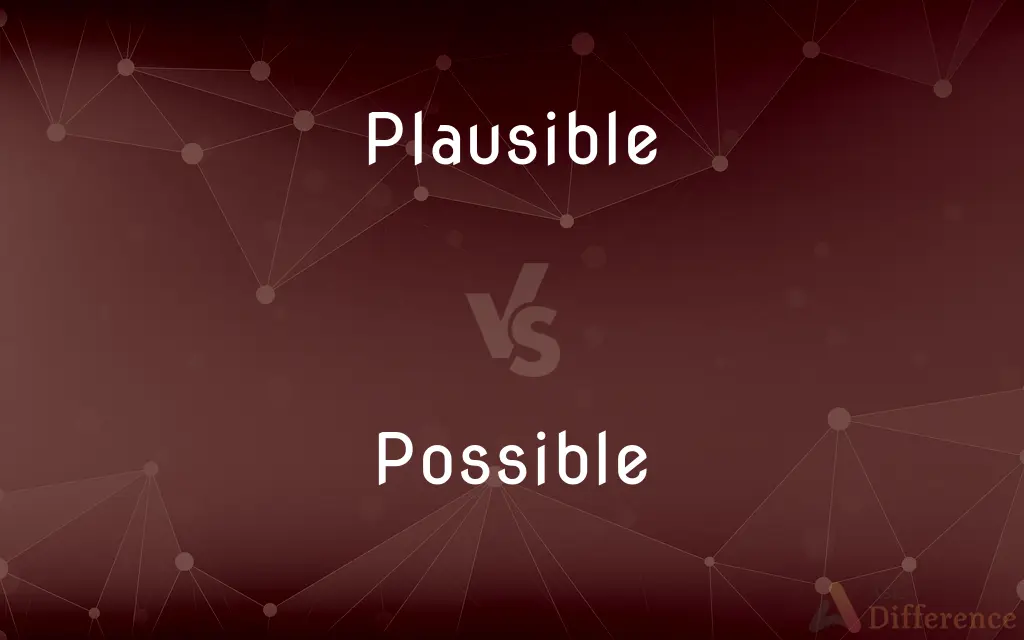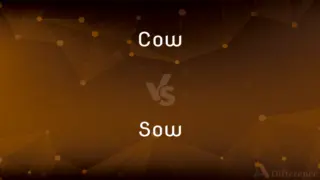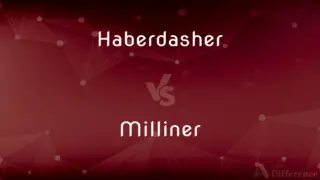Plausible vs. Possible — What's the Difference?
By Tayyaba Rehman — Updated on October 31, 2023
Plausible suggests something is believable or likely to be true, while possible indicates something can happen or be done, without regard to its likelihood.

Difference Between Plausible and Possible
Table of Contents
ADVERTISEMENT
Key Differences
The term "plausible" implies that a concept or idea appears credible or convincing based on the evidence or reasoning presented. It suggests that something not only can be true but also has a reasonable chance of being true. In contrast, "possible" simply means that something is capable of happening or existing, without any assertion of its likelihood.
Plausible scenarios are often based on logic or experience; they make sense in a given context and align with what is known to be true or probable. Possible scenarios don't require this level of credibility; they encompass anything that is not ruled out by facts or laws of nature, regardless of probability or belief.
When someone presents a plausible argument, they are often implying that there is some level of likelihood or support for their claim. In doing so, they are appealing to a sense of reasonableness or foreseeability. However, a possible argument needs no such foundation; it only requires that the claim is not impossible.
In everyday use, plausible is often a word that signifies skepticism but acknowledgment of potential truth, whereas possible might be used to express hope or opportunity without commitment to the odds of realization. "Plausible" implies a critical evaluation has been made, whereas "possible" does not necessarily involve such scrutiny.
Being plausible can often affect the perception of possibilities, as what is deemed plausible can limit or expand the range of what is considered possible. However, all plausible events are inherently possible, but not all possible events are considered plausible.
ADVERTISEMENT
Comparison Chart
Definition
Appears reasonable and believable.
Can happen or be done.
Likelihood
Suggests a higher degree of likelihood.
Does not comment on likelihood.
Relation to Evidence
Requires supporting evidence or reasoning.
Does not require evidence, only lack of impossibility.
Usage Context
Often used in arguments and hypotheses.
Used in general situations.
Connotation
Conveys a sense of credibility.
Conveys capability or opportunity.
Compare with Definitions
Plausible
Persuasively possible; within the realm of believability.
It's plausible that the leak came from within the organization.
Possible
Within the limits of ability, capacity, or realization.
He did the best job possible under the circumstances.
Plausible
Deserving acceptance in thinking or speaking.
His argument was plausible enough to sway the jury.
Possible
That can be conceived or imagined.
Is it even possible to finish this project on time?
Plausible
Seemingly or apparently valid, likely, or acceptable; credible
A plausible excuse.
Possible
Not forbidden or excluded from being possible.
With this new evidence, a different outcome is possible.
Plausible
Appearing worthy of belief.
His alibi for the night of the crime seemed plausible.
Possible
That may exist or happen, but that is not certain or probable.
It's possible that she'll change her mind.
Plausible
Seemingly valid or acceptable; credible.
The theory is plausible given the known facts.
Possible
Capable of happening, existing, or being true without contradicting proven facts, laws, or circumstances
Is it possible to move faster than the speed of light?.
Plausible
Persuasive or ingratiating, especially in an effort to deceive.
Possible
Capable of becoming or of being made to be so; potential
Possible suspects in the case.
A possible site for the new capital.
Plausible
Seemingly or apparently valid, likely, or acceptable; conceivably true or likely.
A plausible excuse
Possible
Capable of occurring or being done in accordance with something specified. Used with the superlative
You'll get the best possible care at this hospital.
Plausible
Obtaining approbation; specifically pleasing; apparently right; specious.
A plausible pretext; plausible manners; a plausible delusion
Possible
Capable of happening but of uncertain likelihood
It is possible that you might feel some discomfort after the procedure.
Plausible
(obsolete) Worthy of being applauded; praiseworthy; commendable; ready.
Possible
Permissible
Is it possible to enter the gallery at this hour?.
Plausible
Worthy of being applauded; praiseworthy; commendable; ready.
Possible
Able but not certain to happen; neither inevitable nor impossible.
Rain tomorrow is possible, but I wouldn't bet on it.
It's not just possible, it's probable that there will be rain tomorrow.
Plausible
Obtaining approbation; specifically pleasing; apparently right; specious; as, a plausible pretext; plausible manners; a plausible delusion.
Possible
(comparable) Capable of being done or achieved; feasible.
It's possible for anyone to learn to pay the bagpipes.
Plausible
Using specious arguments or discourse; as, a plausible speaker.
Possible
Being considered, e.g. for a position.
Jones and Smith are both possible for the opening in sales.
Plausible
Apparently reasonable and valid
Possible
Apparently valid, likely, plausible.
Plausible
Likely but not certain to be or become true or real;
A likely result
He foresaw a probable loss
Possible
A possible one.
Plausible
Within the realm of credibility;
Not a very likely excuse
A plausible story
Possible
A possible choice, notably someone being considered for a position.
Jones is a possible for the new opening in sales.
Plausible
Appearing to merit belief or acceptance;
A credible witness
A plausible story
Possible
(rare) A particular event that may happen.
Plausible
Having an appearance of truth or reason.
She made a plausible excuse for missing the deadline.
Possible
Capable of existing or occurring, or of being conceived or thought of; able to happen; capable of being done; not contrary to the nature of things; - sometimes used to express extreme improbability; barely able to be, or to come to pass; as, possibly he is honest, as it is possible that Judas meant no wrong.
With God all things are possible.
Possible
Something that can be done;
Politics is the art of the possible
Possible
An applicant who might be suitable
Possible
Capable of happening or existing;
A breakthrough may be possible next year
Anything is possible
Warned of possible consequences
Possible
Existing in possibility;
A potential problem
Possible uses of nuclear power
Possible
Possible to conceive or imagine;
That is one possible answer
Possible
Capable of being done or achieved.
A manned mission to Mars is possible within the decade.
Common Curiosities
Can something be possible but not plausible?
Yes, many things are possible but might not seem plausible under current understanding or evidence.
How do you use plausible in a sentence?
You could say, "Her explanation for the delay was plausible."
What does plausible mean?
Plausible means something appears believable or convincing.
What does possible mean?
Possible refers to something that can happen or be done.
How do you use possible in a sentence?
You might say, "It's possible that we'll receive the shipment by Tuesday."
Can plausible be used to describe facts?
Plausible is typically used for things that seem true but are not confirmed as facts.
Does possible imply success?
No, possible merely indicates capability or occurrence, not the success rate.
Are plausible and possible synonyms?
They are not synonyms; plausible implies believability, while possible implies capability.
Can laws of nature make something implausible?
Yes, if something defies the laws of nature, it is typically considered implausible.
Is everything plausible also possible?
Yes, if something is plausible, it's also within the realm of possibility.
Is plausible a subjective term?
Yes, what is plausible can vary based on individual judgment or perspective.
What makes something no longer possible?
Something is no longer possible if it defies logic, facts, or physical laws.
Is there a connection between plausible and proof?
Plausibility often requires some degree of proof or evidence, whereas possibility does not.
How do context and knowledge affect what is plausible?
As context and knowledge expand, what is considered plausible can change accordingly.
Does possible have degrees, like 'more possible'?
Not typically; something is either possible or it's not, although people sometimes use "more possible" informally to discuss likelihood.
Share Your Discovery

Previous Comparison
Cow vs. Sow
Next Comparison
Haberdasher vs. MillinerAuthor Spotlight
Written by
Tayyaba RehmanTayyaba Rehman is a distinguished writer, currently serving as a primary contributor to askdifference.com. As a researcher in semantics and etymology, Tayyaba's passion for the complexity of languages and their distinctions has found a perfect home on the platform. Tayyaba delves into the intricacies of language, distinguishing between commonly confused words and phrases, thereby providing clarity for readers worldwide.














































